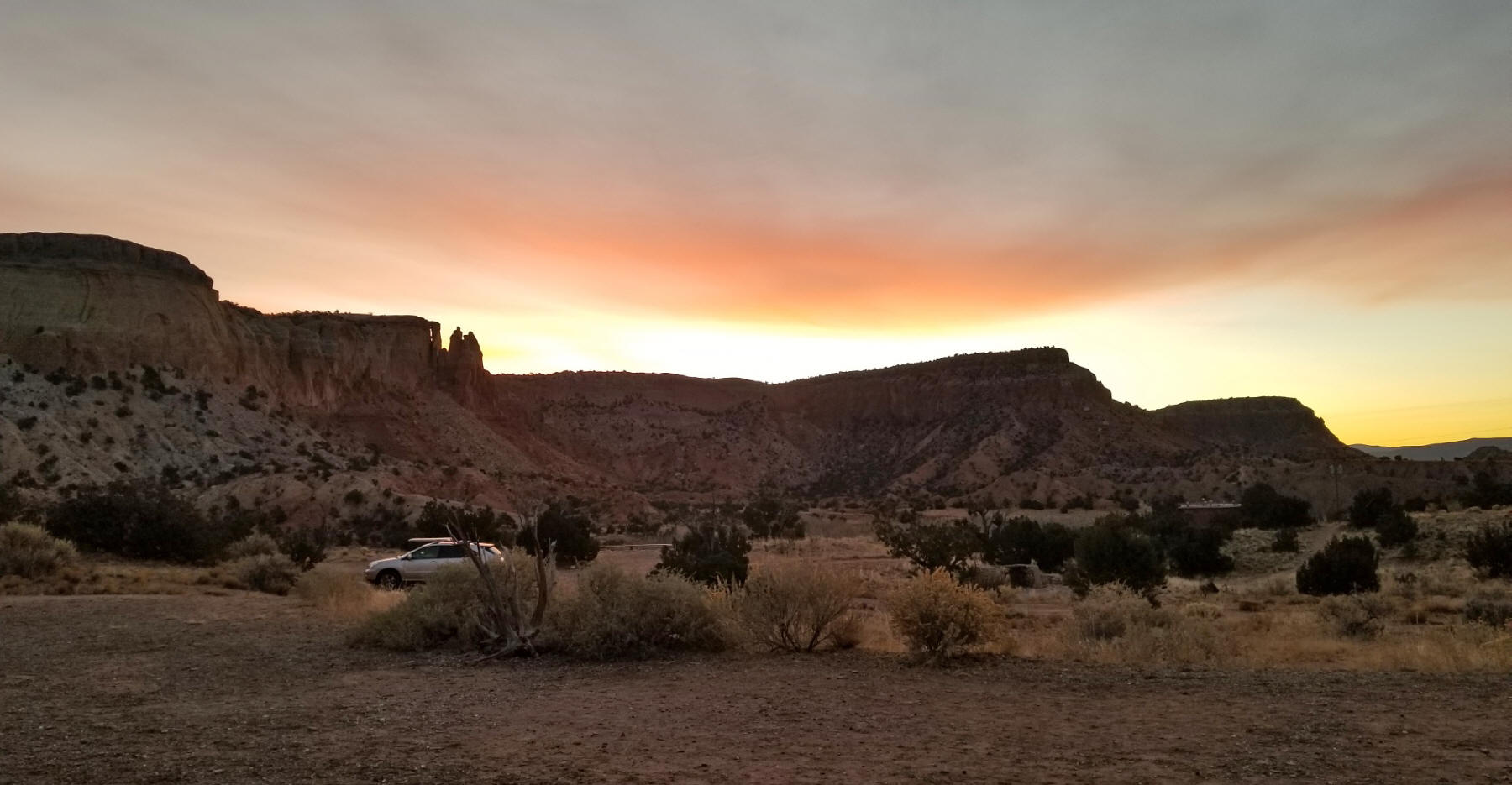|
Take a Road Trip Thru Thoroughbred Country
Story and photos
by Katheen Walls
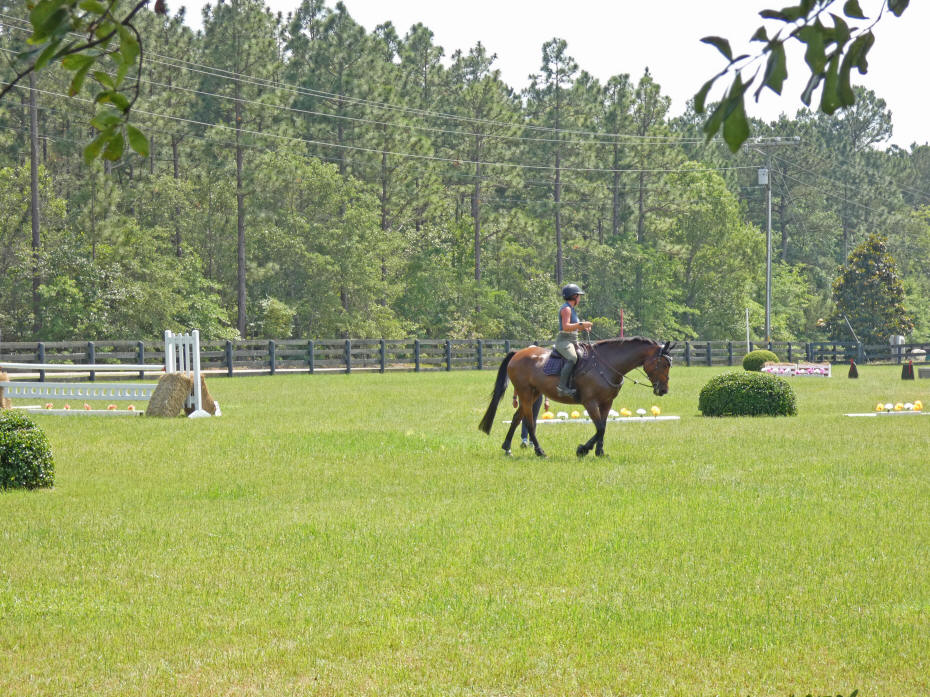
Thoroughbred Country in South Carolina is a culture rich
area. When the elite of the Gilded Age picked Aiken. South
Carolina as their "Winter Colony," they created a unique
culture. Since much of their sports focused on horses, when they
descended on Aiken, they brought their high-priced thoroughbred
racehorses with them. Thus, the name Thoroughbred Country today.
But there is more to present day Thoroughbred Country than
Aiken. Blackville, Barnwell, and North Augusta each have their
unique personalities. We even saw part of a polo match.
Blackville
Blackville was established in 1833 as a
marketing and transportation center until the Civil War.
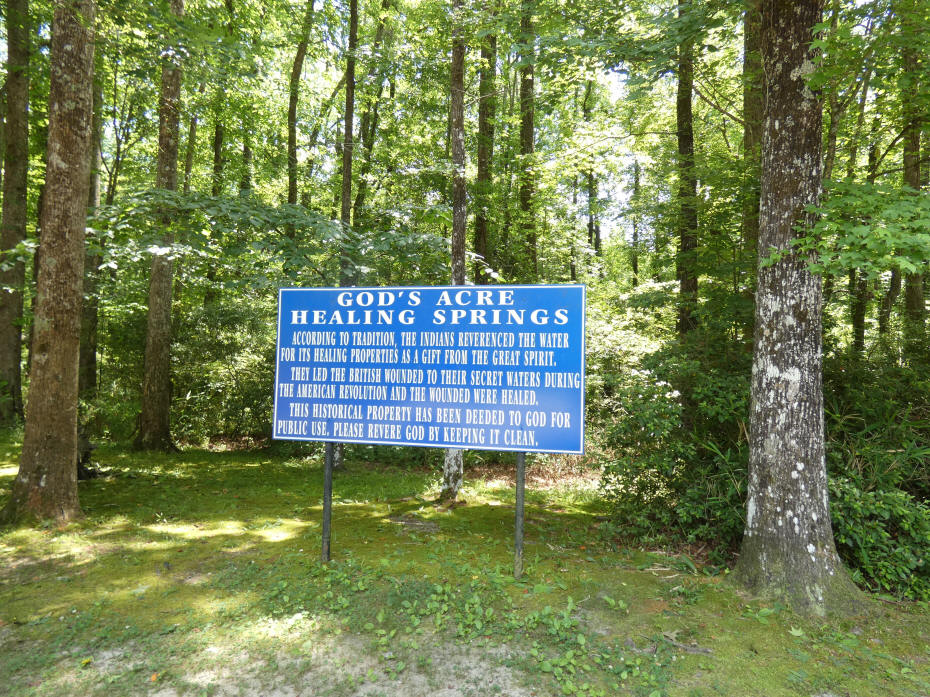
Today, its main claim to fame is
God's Acre Healing Springs. Before Europeans came here,
Native Americans believed the spring had natural healing powers.
During the Revolutionary War, they brought wounded soldiers here
to drink. The soldiers went back to their base and told their
comrades that the spring had healed them.
We visited the springs and sampled the
water. I can't say it healed me, but there were several locals
getting the water, so they must believe it does some good. The
sign telling its history also states is had been deeded to God.
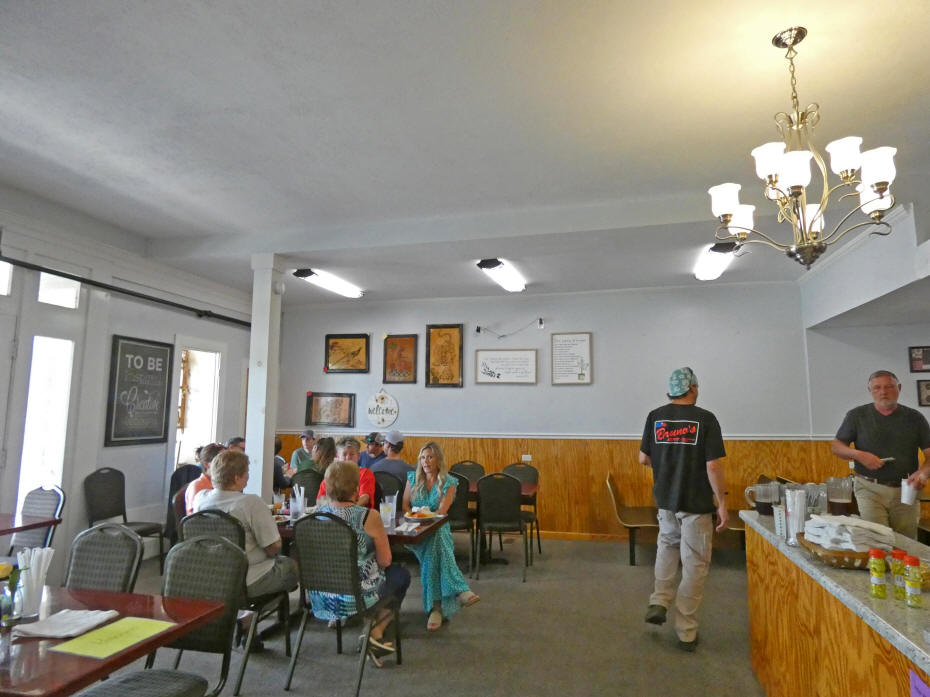
We had lunch at
Miller's Bread Basket. They are famous for their cafeteria
style home-cooked Amish-Mennonite foods. You choose salads,
homemade bread, and then you pick from choices of meats and
vegetables. I had the fried chicken with cheese grits, bets, and
slightly sweet bread that was fantastic. Miller's Bread Basket
began operation in 1987 as a family-owned restaurant. It was
featured on PBS Backroad Bites in 2019.
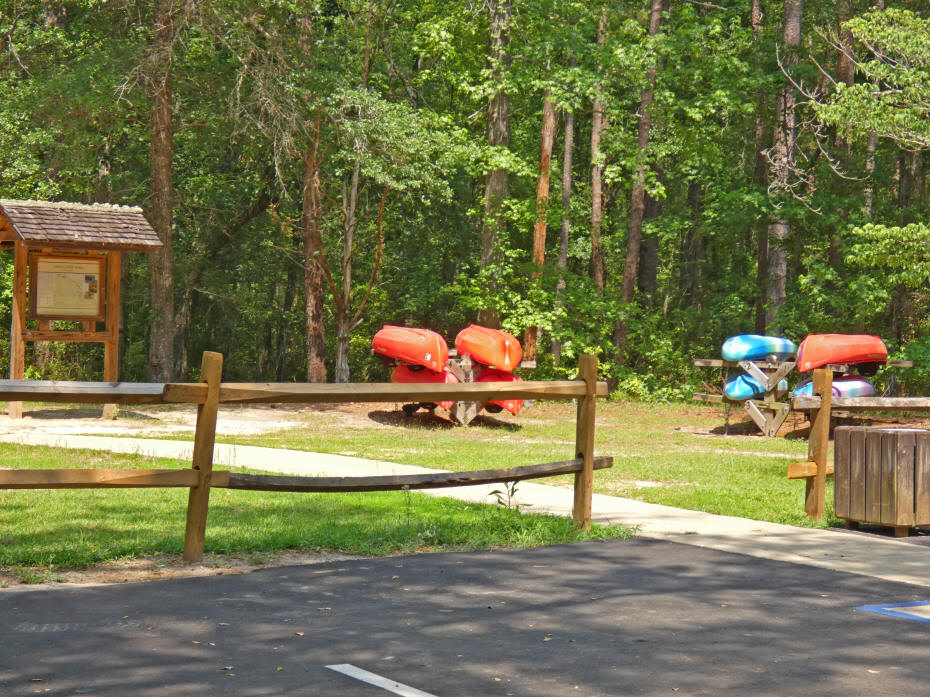
Barnwell State Park is worth a stop even if you aren't
camping or staying in one of its cabins. The park was built in
the 1930s by the Civilian Conservation Corps, and some of the
original structures remain, including the tiered-spillway, old
pump-house and two picnic shelters. The park has a swimming
beach, the Dogwood Interpretive Trail, a moderately difficult
1.5-mile-long trail, three lakes crappie, bream, bass and
catfish that also accommodate non-motorized boats.
Barnwell
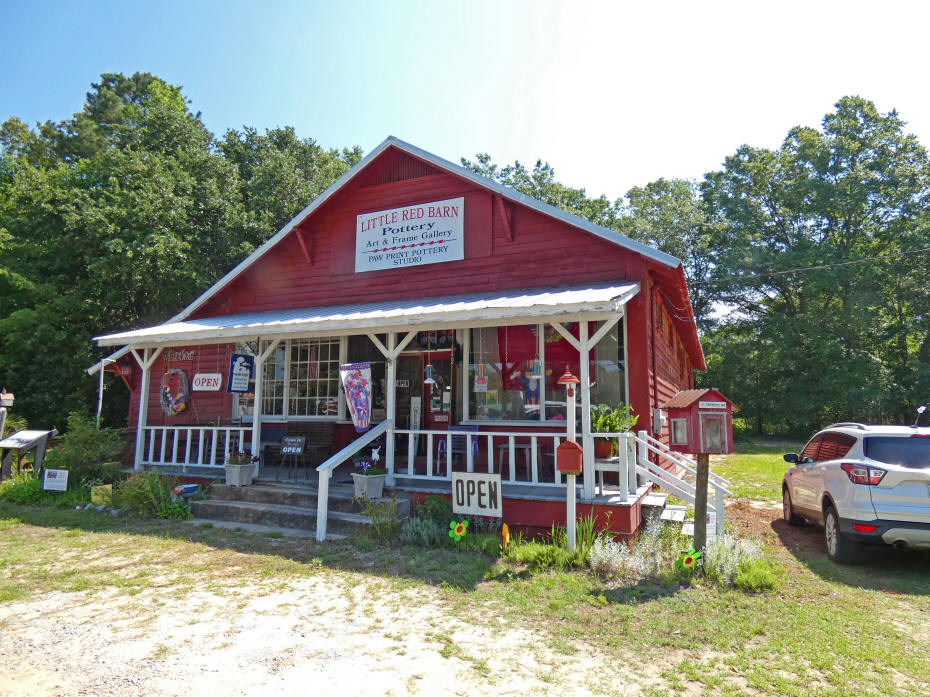
Little Red Pottery was the Historic Leigh Commissary that
was moved here in 1952. It was part of a mill village that made
the shipping crates for the fruit and vegetable and poultry
industry. It was built in 1926. Everyone called it the Red Barn
since it's been here, so when Liz took it over in 1998 as her
pottery studio and art gallery, she kept that name. Besides
Liz's work, which she creates here, there are about 25 different
artists. My husband is also an artist. He does wood art and
builds furniture. Liz told us," We have an eclectic mix of
everything from a 13-year-old photographer whose artwork we're
featuring right here in the front and on the walls, to an
83-year-old artist who does toll painting, Bavarian folk art."
Liz also does a program teaching inmates
pottery at the Allendale Correctional, which is a level two
South Carolina prison.
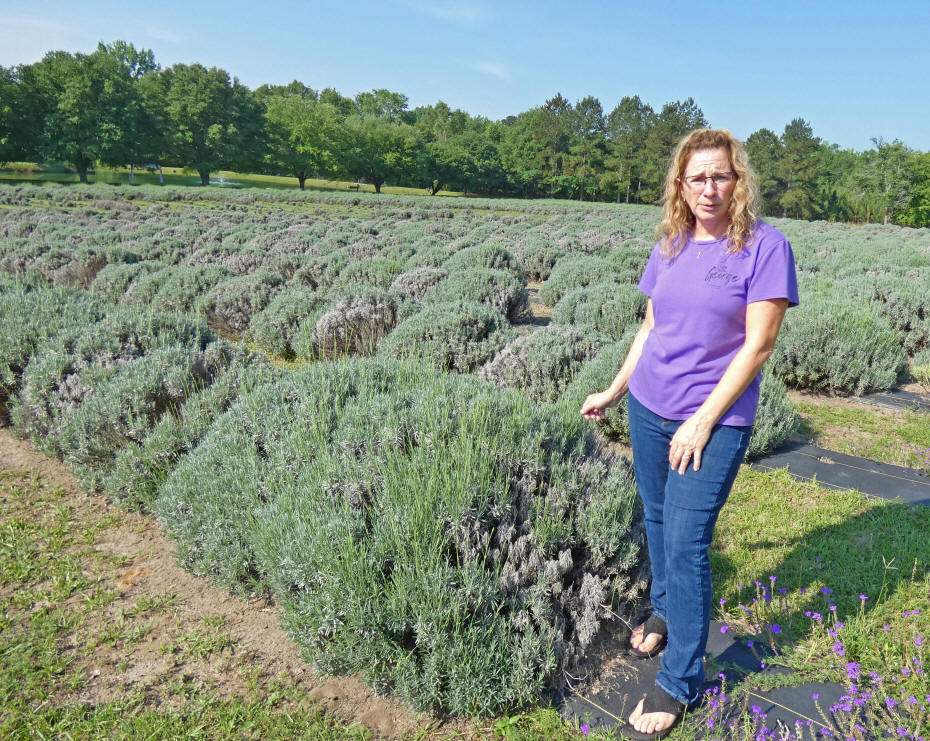
King George Lavender Farm, owned by George and Elinor Poole,
is a place where just breathing the lavender scented air is
relaxing. We met Elinor there, and she told us how they came to
buy the farm. "We bought the farm in 2016. In 2018, we became
official southerners and moved down from New York. We then
started building. This farm looked nothing like this when we
purchased it. It was a diamond in the rough, to say the least."
She told how they rebuilt some buildings
and a greenhouse, and began growing lavender. We walked out to a
beautiful little lake near their cottage and admired the
lavender plans. They were just about to bloom when we visited.
Elinor told us they grow teas and some herbs, but everything
related to lavender.
Inside the small store, we saw a variety of
products they create using lavender. They have a Lavender
Festival and an Agriculture and Art Tour in June. There is live
entertainment, food, and games at the Lavender Festival and
plein air artist create paintings inspired by the farm. They
offer u-pick-lavender during both festivals.
The farm also hosts weddings and events and
there is even Pemberley Cottage that you can rent while visiting
the area.
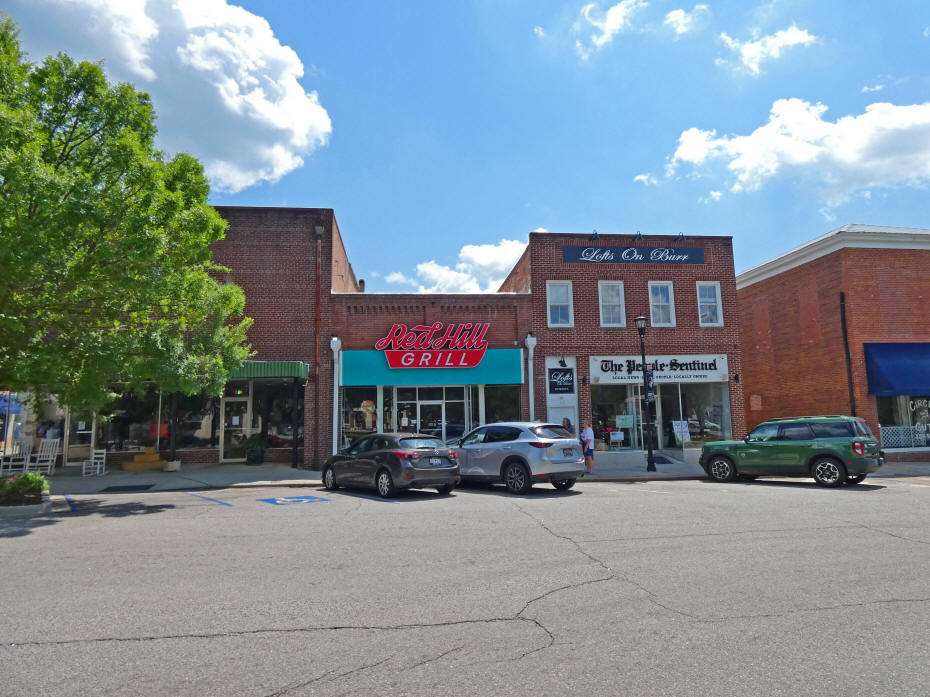
The Lofts on
Burr are another charming rental you find here. It's sort of
a boutique hotel with only five rooms and a conference center.
The building dates back to the early 1900s, when it was a
doctor's office. They kept the old brick wall and original floor
but have them beautifully renovated. They are on the Circle in
downtown Barnwell where the historic courthouse and beautiful
park make you feel as if you stepped back into the late 19th
century.
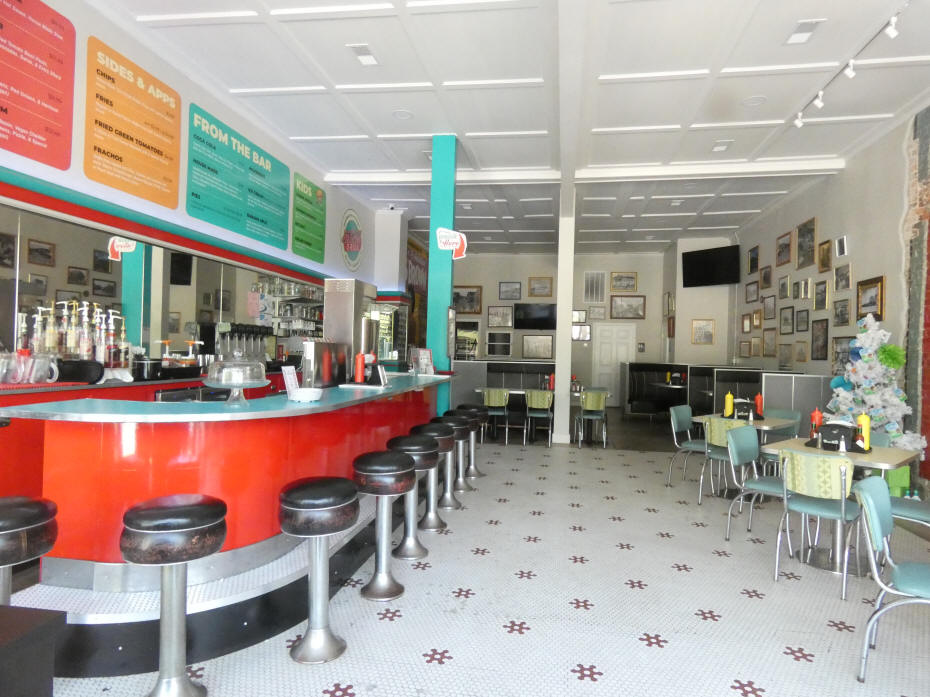
Red Hill Grill
Is a new casual restaurant keeping an old tradition alive. The
building was once a drugstore and when the owners were
renovating it, they discovered an old Coca Cola mural on one
wall.
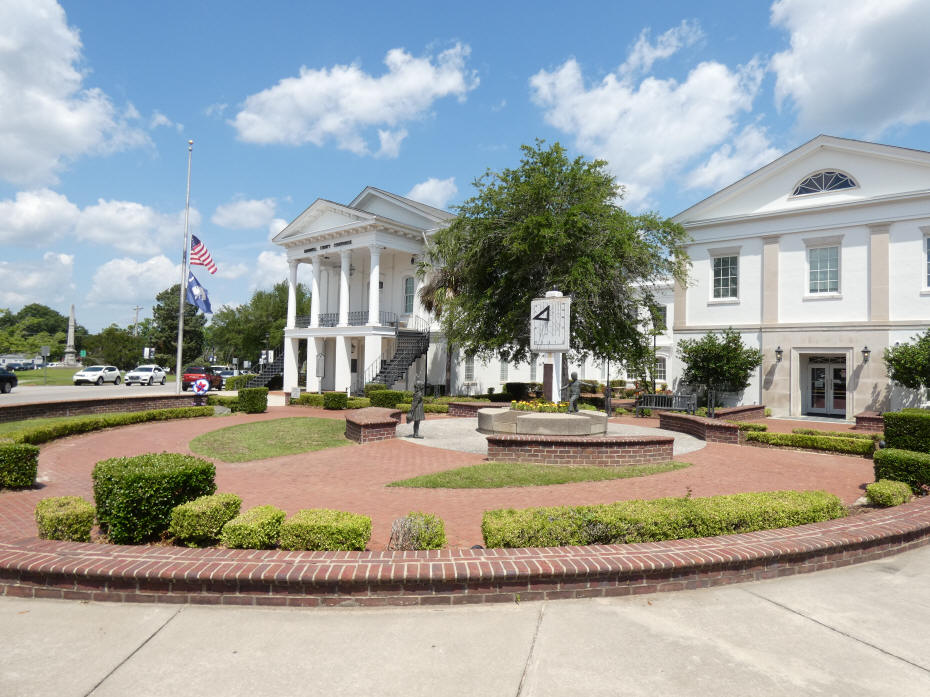
Stroll across the park in the circle and
you'll discover a unique vertical
sundial in front of the courthouse that was given to the
town in 1858 by Joseph D. Allen, a local state senator. It is
believed to be the only free-standing vertical sundial in the
United States and though it was erected prior to 1883 when
standard time began being used, it keeps perfect time within two
minutes.
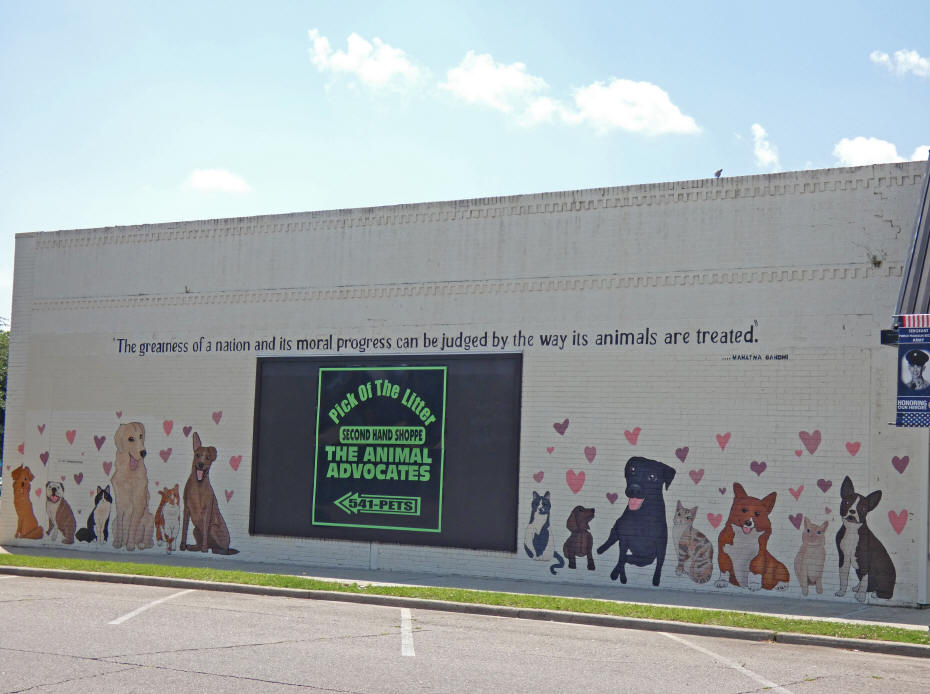
My favorite mural in Barnwell is on the
wall of the
Pick of the Litter, Animal Advocated Thrift Store. It
features numerous cats and dogs and a very true saying.
Aiken
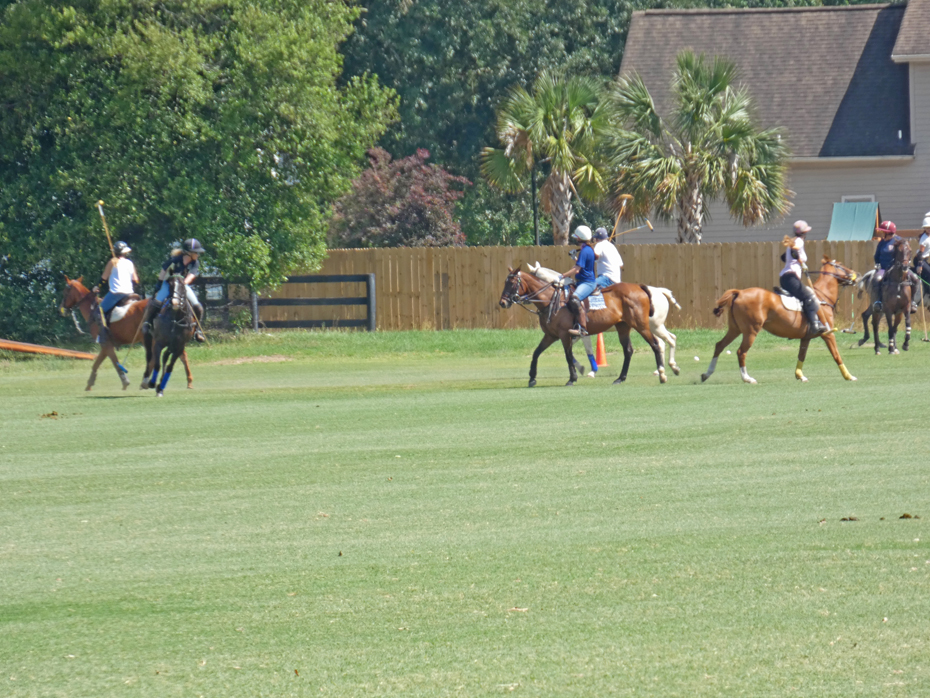
Aiken is the largest and most horse-related
town in Thoroughbred Country. Many of the grand "cottages" built
by wealthy northerners are still standing. Thoroghbreds and
polo ponies are everywhere.
Take a Tour
We took a
Tailored Tour
with Marty Bailey, who showed us many of the historical homes
and told us some insider stories. Marty tailors a tour to your
interest. She did a great job with us.
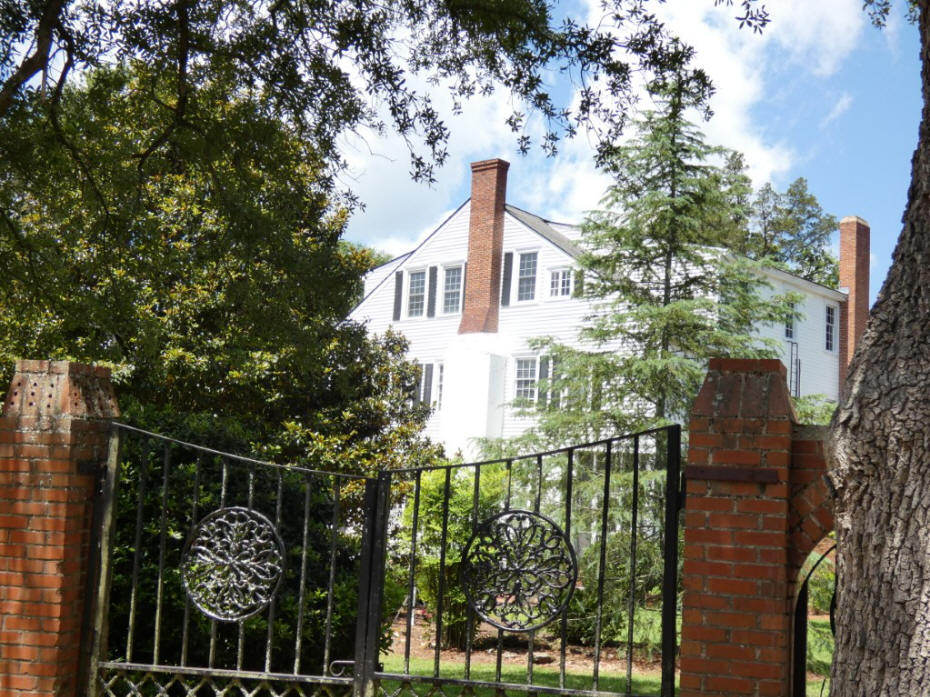
She drove us by one of the oldest houses in
Aiken. "Chinaberry," the Colonial Revival, home of Dr. William
Williams, who is responsible for Aiken getting the railroad.
Williams visited William Aiken, Sr., president of South Carolina
Canal and Railroad Company and offered part of his land for an
extension of the train route that had recently come to
Charleston.
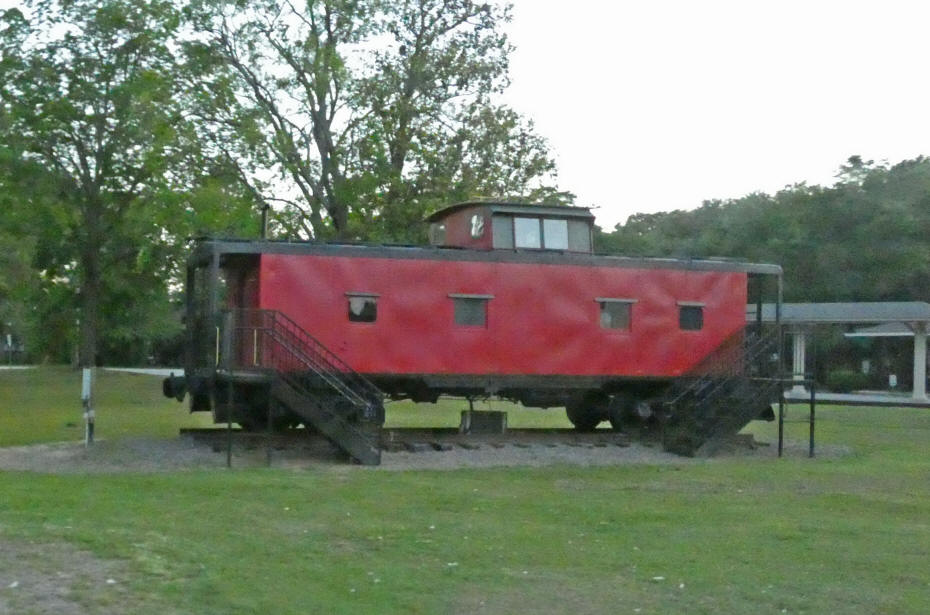
Aiken sent a survey crew, led by Alfred
Dexter, who stayed at Chinaberry while surveying. He told Aiken
the area was too hilly for the train to function here. Meantime,
he fell in love with Dr. Williams' daughter, Sarah, and asked
Dr. Williams for her hand. Williams replied, "I'd love to have
you as a son-in-law. If only I had a railroad." Naturally,
Williams got the railroad; Sarah married Dexter; and the town
was incorporated and named Aiken.
One home on our tour, Morrison-Wright
Cottage, built in 1900 by Dr. Wright and later rented to the
Cabots known as the "first families of Boston." Dr. Wright put
in a secret door so his teenaged sons could have girlfriends
over at night without their mother knowing it.
Marty showed us another building with an
interesting story. The Gothic Revival style St. Mary Help of
Christians Church, built to replace a smaller chapel in 1905,
had a choir.. and one parishioner was a crooner. On Easter
Sunday, 1960, he tried to join the choir, but as he went up the
stairs, the director called out, "I'm sorry, you're gonna have
to leave, this is only for choir members."
Bing Crosby apologized and went back to his
seat. When the director realized who she had rejected, she
posted a sign the following Sunday that read "choir loft for
choir members and Bing Crosby only."
Bing Crosby did return and sing with the
choir.
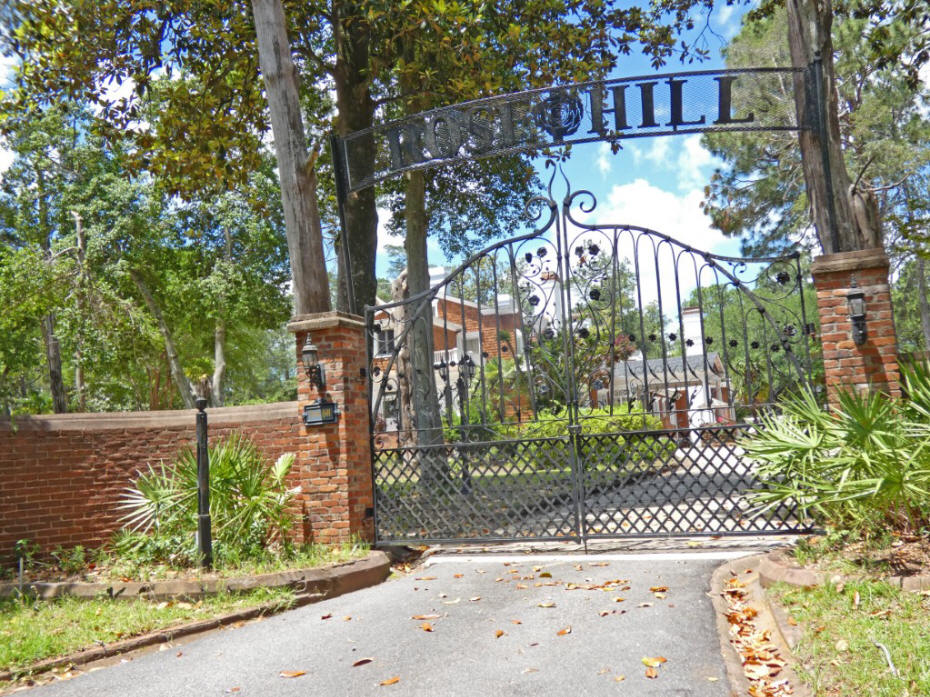
Of course, houses this old have ghost
stories. Rose Hill, built in the early 1900s for Colonel
Sheffield Phelps and his wife, on the site of an antebellum
house destroyed during the Civil War Battle of Aiken. Rose Hill
has over 20 rooms, and the grounds include greenhouses, stables,
garage, and kennels with a kitchen so the cooks could prepare
fresh meals for their West Highland Terriers.
Marty used to work there when it was a
hotel and restaurant. She told about one time, "I'd be in the
home, all the doors locked. The rest of the crew would be down
in the stables. And a woman's voice would call out my name. At
first, I thought it was the owner's mother. But there was nobody
in the house. Then I found out from other employees that they
believe it's the spirit of Mrs. Phelps. She's still hanging
around and when she knows your name, she calls out to you. She's
had family members who were here after she passed who would
actually see her and it scares the dickens out of them, too."
The new owners are hoping to reopen as a
B&B and restaurant.
Willcox Hotel
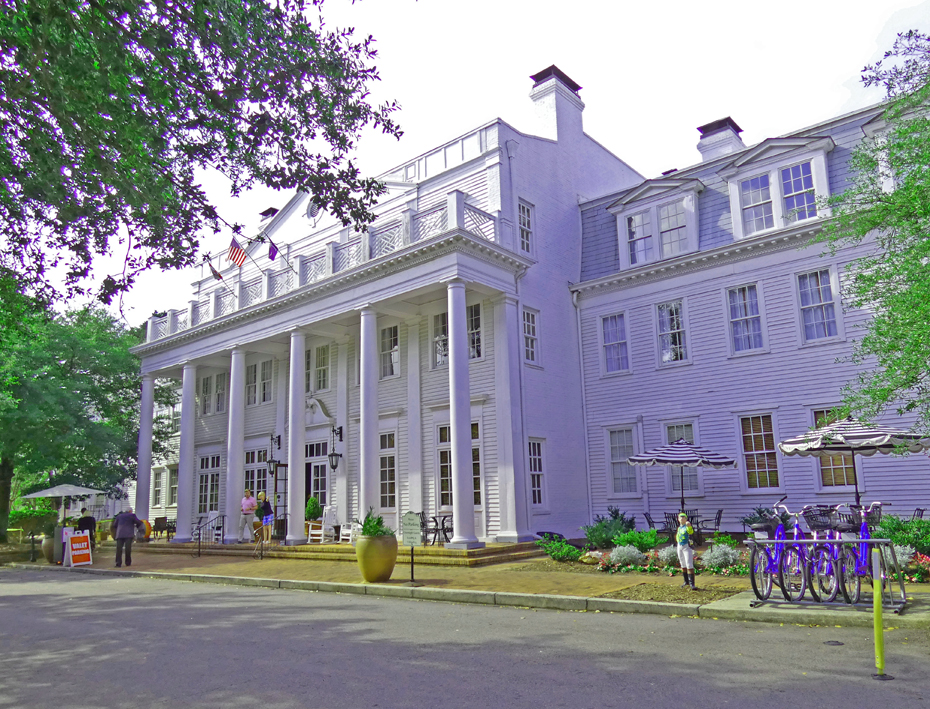
Marty told us some stories about the
Willcox Hotel where we were staying. It catered to the
lifestyle of those wealthy Winter Colonists. It's a beautiful
late 19th century hotel with the feel of an English gentlemen's
club of 1900s. Of course, it only accepted well-to-do guests. A
discreet butler would size up a visitor by looking at the shoes
and give the desk clerk a signal. If the visitor wore hand
stitched shoes, he would be granted a room. If store bought
shoes were on his feet, the desk clerk would reply, "I'm sorry.
We're all booked."
My room had a comfortable bed, 19th century
style furnishings, plus a fireplace and a window seat. It had
all the modern amenities. My window looked out back to where the
train once brought the winter colonists.
Marty told us that President Franklin
Roosvelt would take his private train going to his Warm Springs
winter retreat but his train would always "break down" right out
back and he would take an elevator up to the third floor to meet
with his mistress, Lucy Mercer. The train wouldn't get fixed
until the next day. There's a Roosevelt Suite on the third floor
still.
The pool is worth a visit even if you're
not swimming. It is beautiful.
The dining room is right off the lobby and
offers a complementary breakfast. No continental fare here. You
order off the menu. Dinner is also available in the dining room.
If you like, you can sip a drink in the lobby.
Aiken County Historical Museum
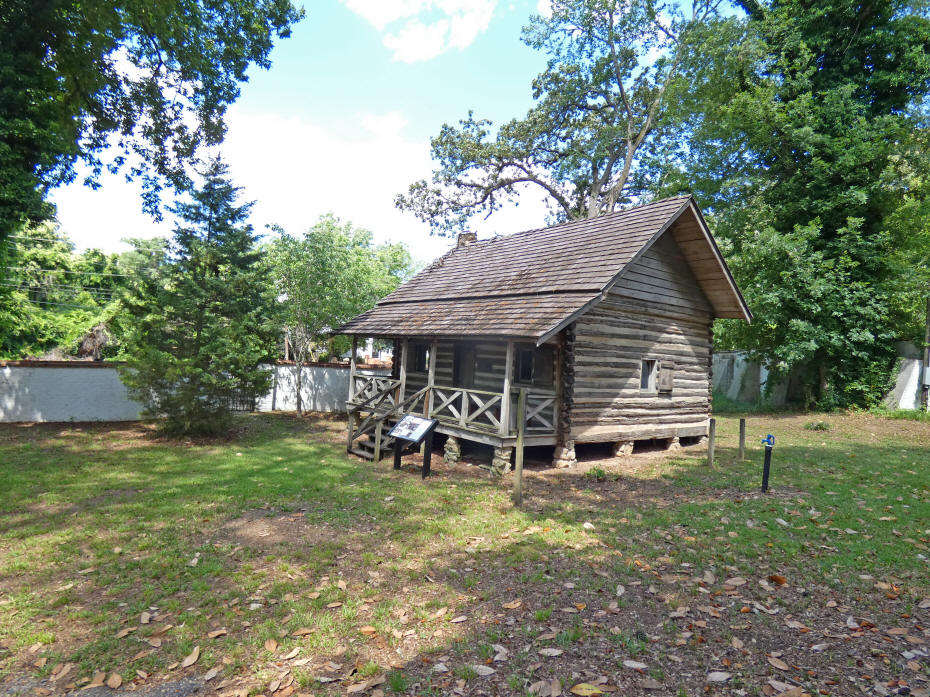
The
Aiken County Historical Museum is housed in Banksia, one of
the Winter Cottages. It belonged to Richard Howe, who expanded
the 1862 farmhouse to a three story 17,500 sq. ft. building. The
museum tells the history of Aiken with hundreds of artifacts.
Things like an antique fire engine that was used from the 1880s
all the way until 1932, several exhibits about the Winter
Colonists including Hope Goddard Iselin, who left Hopelands
Garden to Aiken, a 1890s one-room schoolhouse and an early
19th-century log cabin outside and so much more.
Hopelands Garden
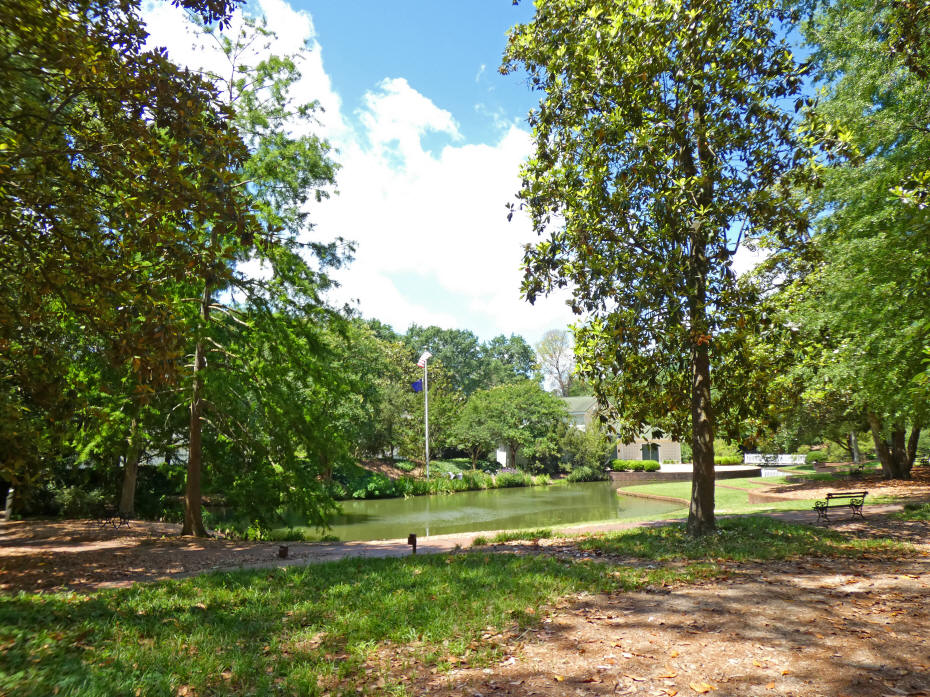
Hopelands Garden are the grounds where the Iselin home once
stood. The home was demolished, but three original structures
remain. The carriage house is now the Aiken Thoroughbred Racing
Hall of Fame. The Doll House, once a playhouse and schoolhouse
for the Iselin children, is now the home of the Aiken Garden
Club Council. The caretaker's cottage is home to the garden
caretaker.
The gardens are filed with 100-year-old
oaks. There's wildlife, an amphitheater, reflection pool, and
three magnificent fountains in the garden.
The Aiken Thoroughbred Racing Hall of Fame and Museum
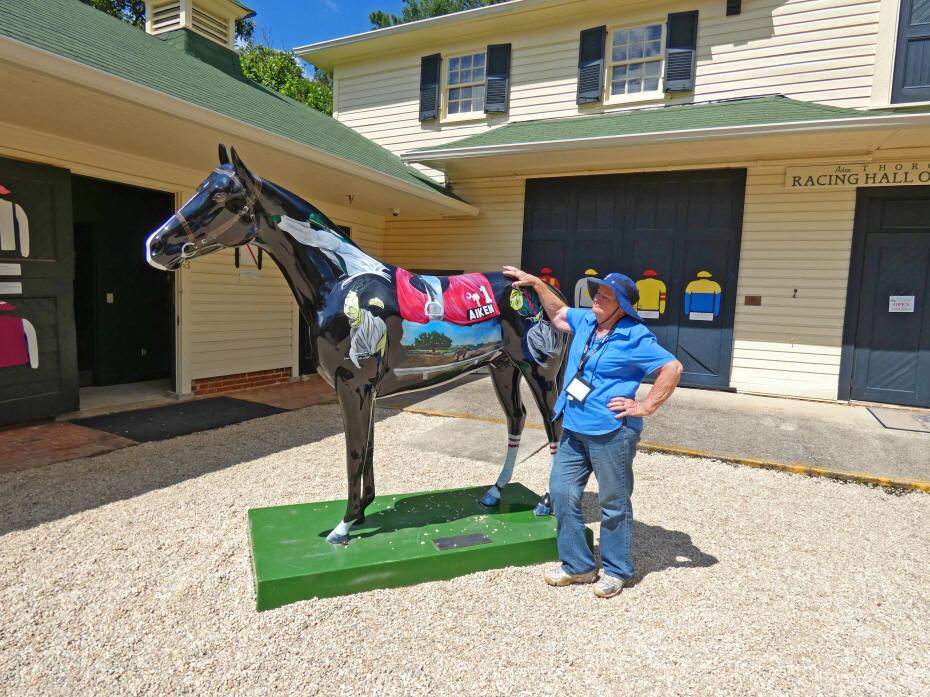
The
Aiken
Thoroughbred Racing Hall of Fame and Museum contains
exhibits about the 40 thoroughbreds that trained at Aiken
Training Track and won national races. Only horses that have won
an Eclipse Award and are trained here get featured here. Many
started at the Aiken Steeplechase, a tradition in Aiken and one
of the oldest steeplechase races in the country, begun in 1930.
Stables
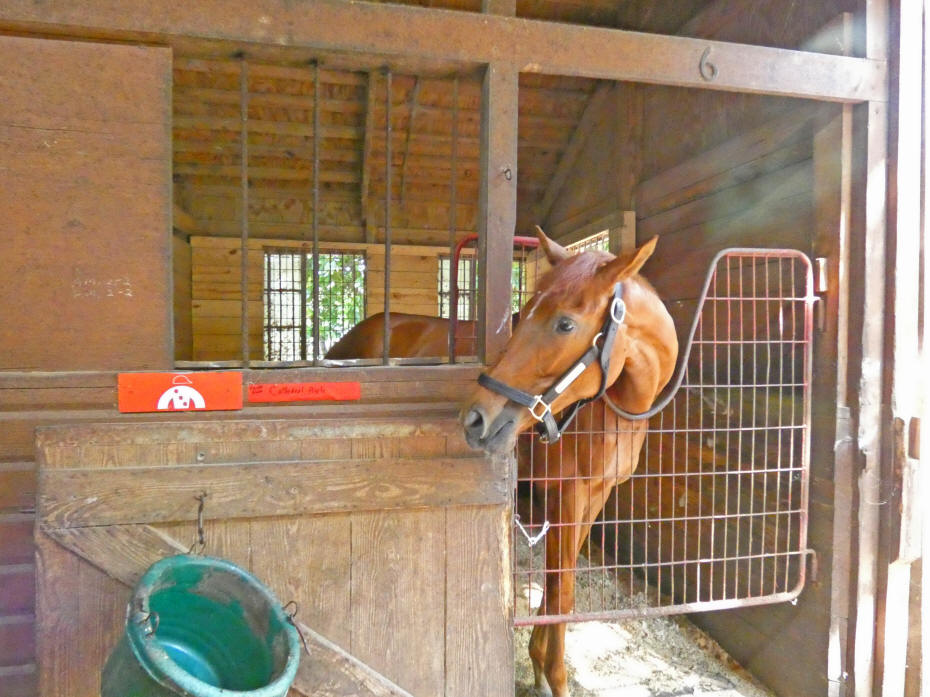
For a bigger picture of the equestrian
tradition, we visited
Legacy Stable,
where Brad Stauffer told us about training racehorses. We also
toured the Ambrose Clark Stables with Lisa Hall, Hall of Fame
and Museum coordinator. It's a historic property that includes a
stable, riding arena, and paddocks in Aiken's horse district
next to the Winthrop Polo Field. They have an indoor track to
exercise horses in rainy weather.
Aiken Training Track
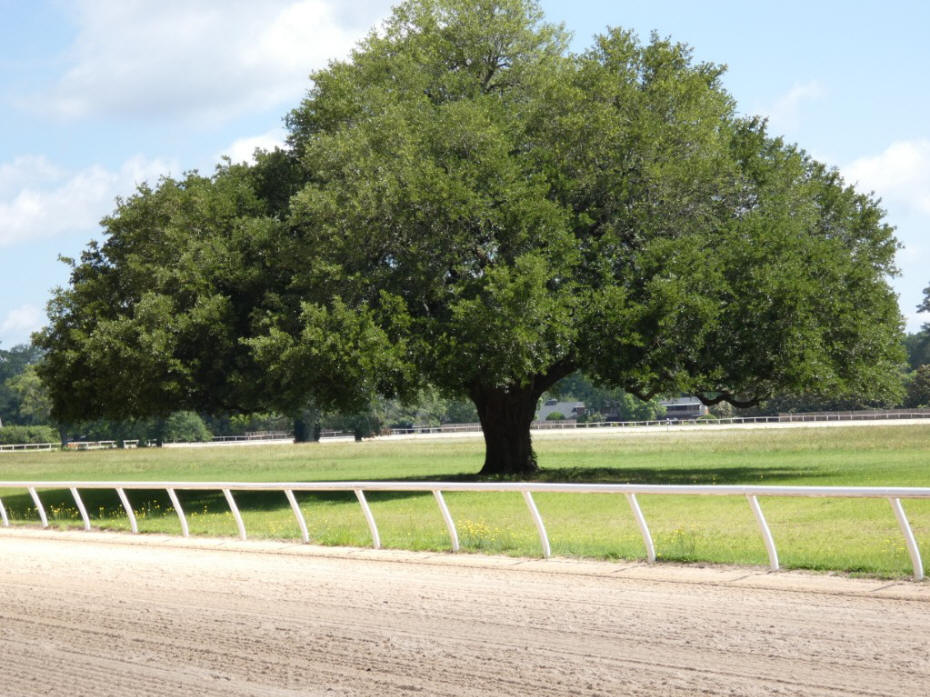
Lisa took us to the
Aiken Training Track
and told us the story of one of their most famous horses. Blue
Peter was the grandson of Man o' War. Blue Peter was owned by
Joseph M. Roebling, of the Brooklyn Bridge family. At two years
old, he won Hopeful Stakes, and Belmont Futurity Stakes, winning
him American Champion Two-year-old Colt honors. In 1948, he was
training for the Kentucky Derby but took sick and died. Lisa
took us to his grave at Aiken Training Track under a huge oak
tree.
Aiken Dining
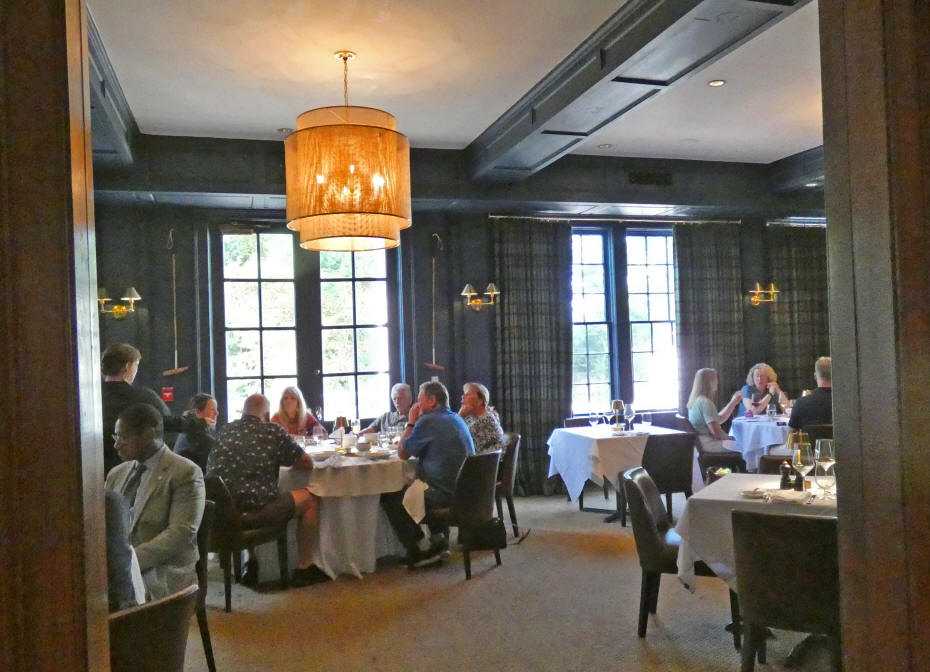
We have a variety of different style dining
experiences. Starting with breakfast and dinner at Willcox, that
was on the upscale side. We had a fantastic home style breakfast
at the
Track Kitchen where the grooms and horse workers often eat.
It's a cash only place. Blue collar style but wonderful food. We
dined at The Feed
Sack, another upscale one where you might run into one of
the racehorse owners.
Good Girl Brewing Co, named in honor of the owner's late
dog, Kate, is a typical brewery with delicious food.
Aiken Art
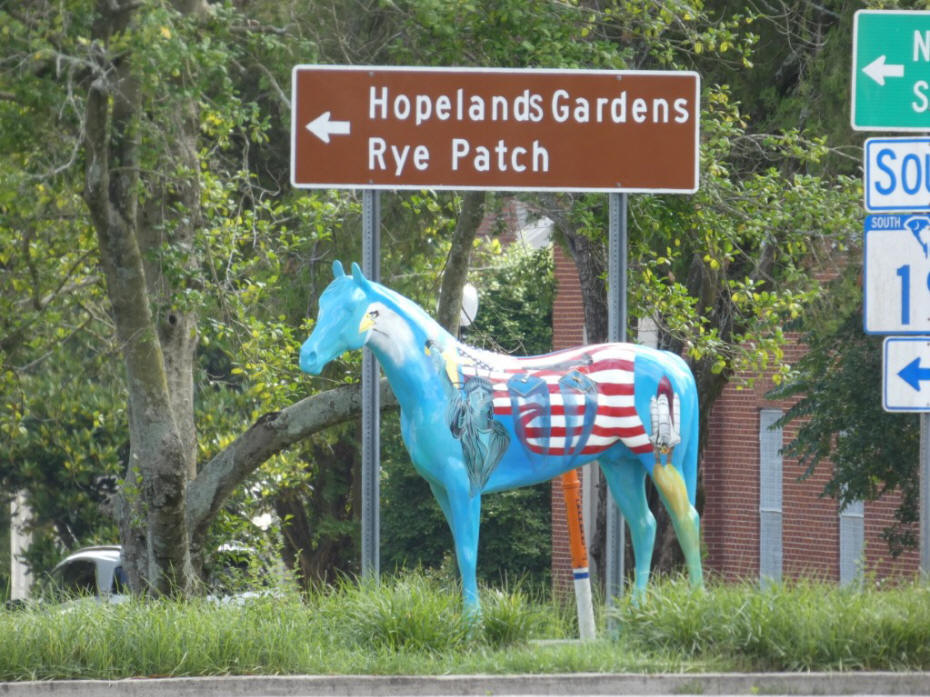
Aiken is an artsy city.
Aiken Center for
the Arts is filled with all varieties of art, paintings,
sculptures, glass art, jewelry art. All over Aiken you'll find
painted fiberglass horses. One of my favorites is the painted
horse, Splendor in the Grass, painted by Jo An King at the art
center. Patriot, in picture above is near Whiskey Alley.
Horse Around Aiken on a Treasure Hunt where
you get a map at the Center for the Arts of nine painted horses
and search for them. When you find all nine, return the map and
win a prize. There are many street murals. Stroll down Whiskey
Alley and checkout the restaurants and shops where you'll find
live entertainment most weekends. Each Thursday In summer,
Market in the Alley blends a farmers' market with live
entertainment. Just across from Whiskey Alley, Amentum Center
for Performing Arts has plays and live entertainment. Aiken even
has its own symphony.
North Augusta
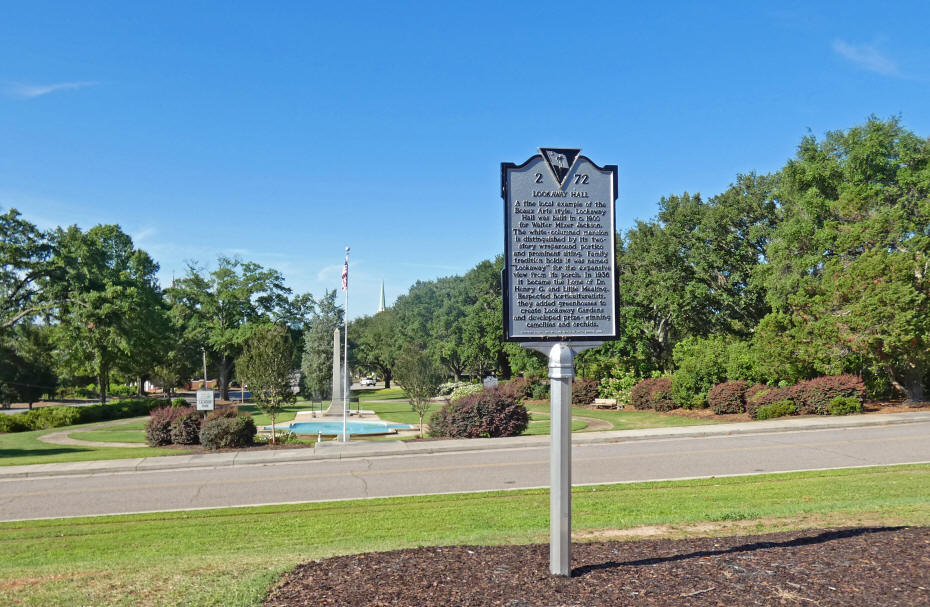
North Augusta began in the 1890s. There
were two brothers from Augusta, James and Walter Jackson, that
started the town. They bought 5-6,000 acres, divided it up into
lots, and created the city. They build adjourning homes facing
the park looking to the Savannah River.
Lookaway Hall
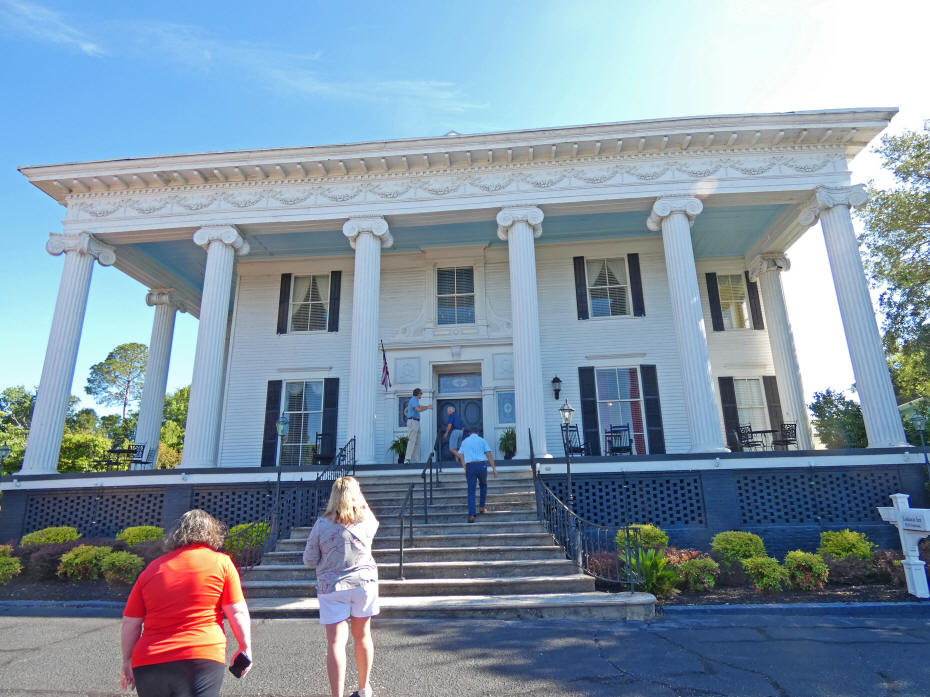
We took a trolley around North Augusta
sites, old and new along the Savannah River, beginning with
Walter's former home named Lookaway Hall by his son. Today, it's
an inn called Lookaway
Inn. The mansion, with five original spacious bedrooms, was
finished in 1900. Ten additional bedrooms are in an addition
that was built on to the back of the house in 1992.
James's house across the street is very
similar and was completed in 1902.
Innkeeper, John Felak, showed us around.
The place is gorgeous. The bedrooms in the annex feature
beautiful furnishings and private bathrooms, but the historic
ambience of the main house grabbed me.
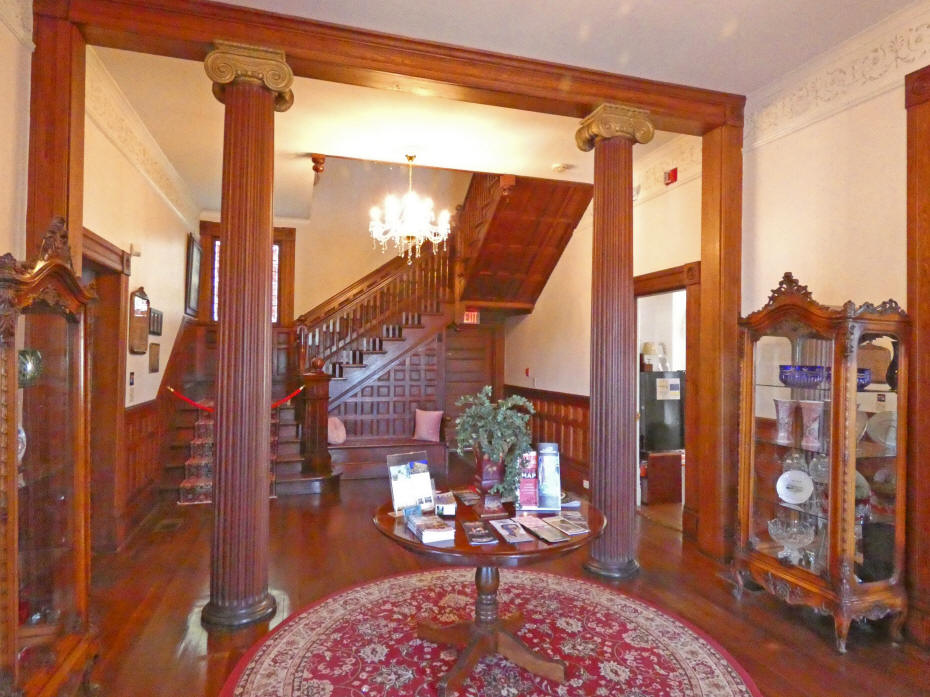
He also told us it has a ghost story or
two. There were several stories, but the one I found the most
interesting is about a butler, John called him "Mr. Reardon." He
was an older gentleman that was homeless, so the Mealing's (the
family who lived in the house last) took him in and made him
their butler. They said he always wore butler's uniform, and he
passed away in the house when he was 100 or so years old.
He's still here. A housekeeper was going
down the stairs, she tripped and started to fall. Then, she saw
an older black gentleman with a butler's uniform on who stopped
her and then he was gone. He's looking after people still.
Arts & Heritage
Center of North Augusta
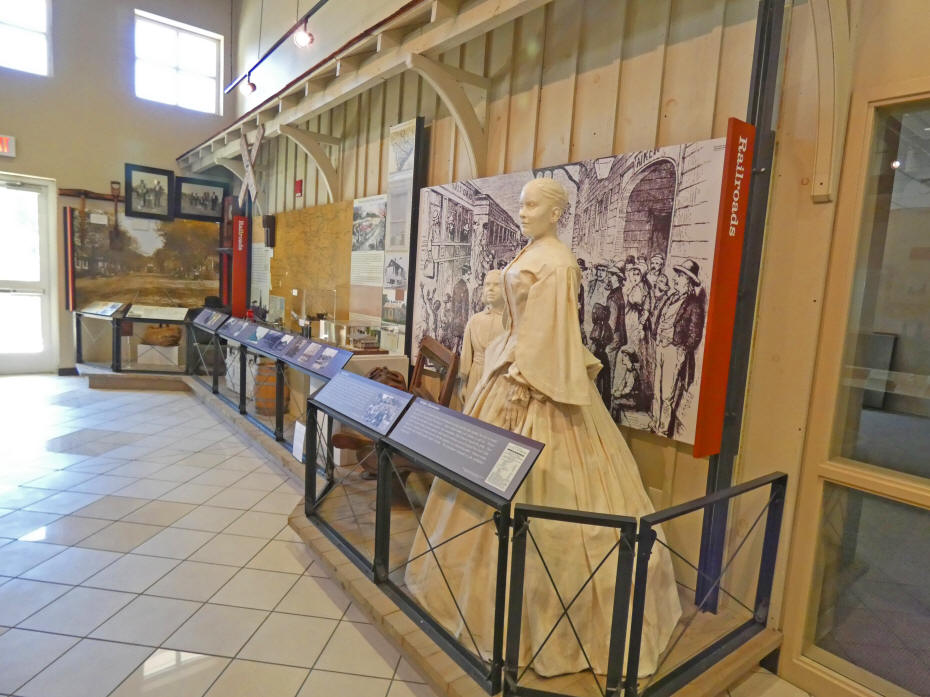
We visited the
Arts & Heritage
Center of North Augusta. It's impressive for a small town.
The entrance way is flanked on the right by a statue of a
railroad conductor, and on the left by an Aztec Style painting.
That's a perfect representation of the museum because inside it
tells the history of North Augusta on one level and displays art
on the other. The railroads were important in this area.
Downtown
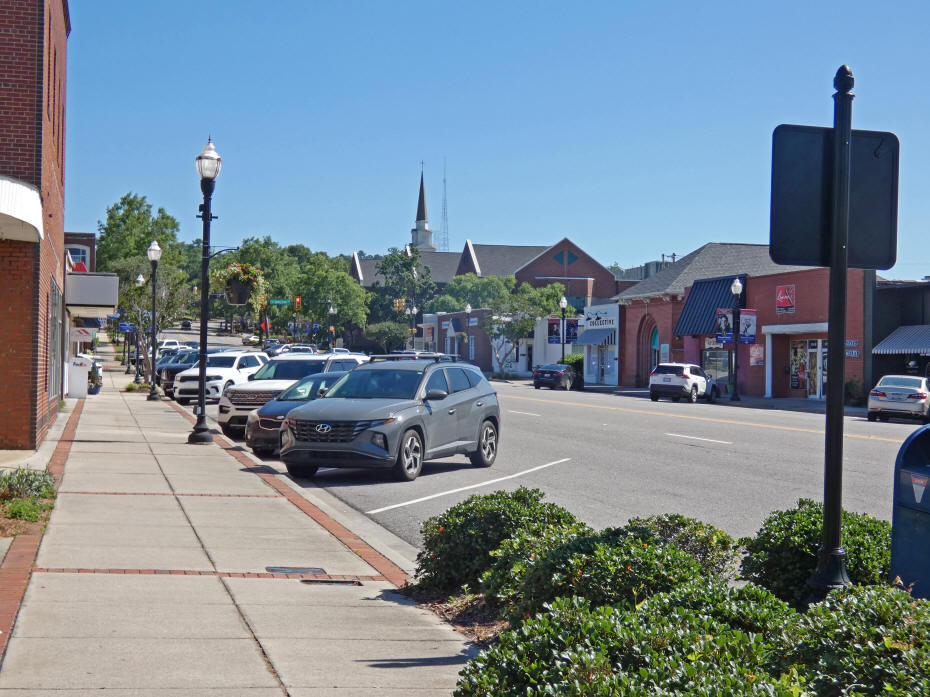
Downtown is an area in flux. It's moving
from a small town to a tourist destination. New dining
opportunities have begun like Sheila Martin, who recently opened
Sheila's Baking
Company and is bringing her hand-crafted Mennonite signature
items like donuts and apple fritters, and cinnamon rolls with
brown butter, cream cheese icing and kolaches—fruit-filled
pastries. She is serving coffee made by North Augusta-based
Stone Roastery.
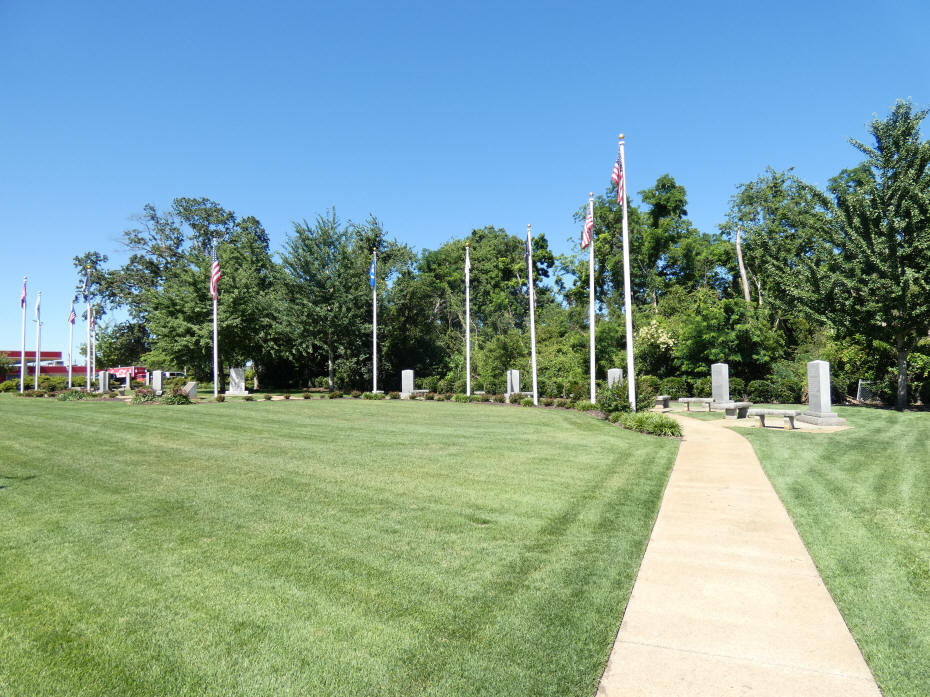
North Augusta still has a lot of greenspaces. There's a
beautiful Veterans Park with plans for a community garden
nearby.
Cavalier's Coffeehouse is serving not only tasty coffee but
has a rotating selection of wines and regional beers. The
courtyard is so pleasant you want to stop and grab a drink.

Grove Gourmet Market premium olive oils and balsamic
vinegars, sourced from Italy, Spain, Portugal, and South Africa.
I spoke with Tia Harville and she said she always dreamed of
opening a restaurant. We spoke of the multiple uses of olive
oil, even olive oil ice cream. The store is amazing. I never saw
that many varieties of olive oil.
If you're looking for traditional ice
cream, there is
Pink Dipper.
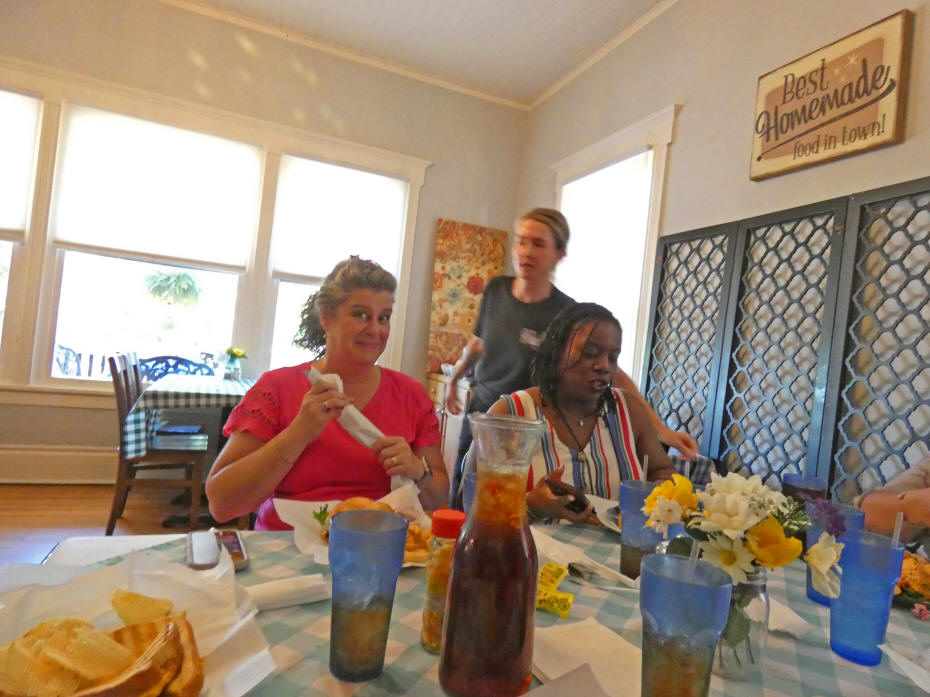
If you prefer traditional southern style
foods, we found that too at
McNeely's
Place where we had brunch. As a Louisiana native, I know
good gumbo when I see it. I saw it at McNeeley's. It had shrimp,
chicken, andouille sausage, and real okra. Plus, the pineapple
banana nut bread I had was so delicious and unique.
Savannah Riverwalk
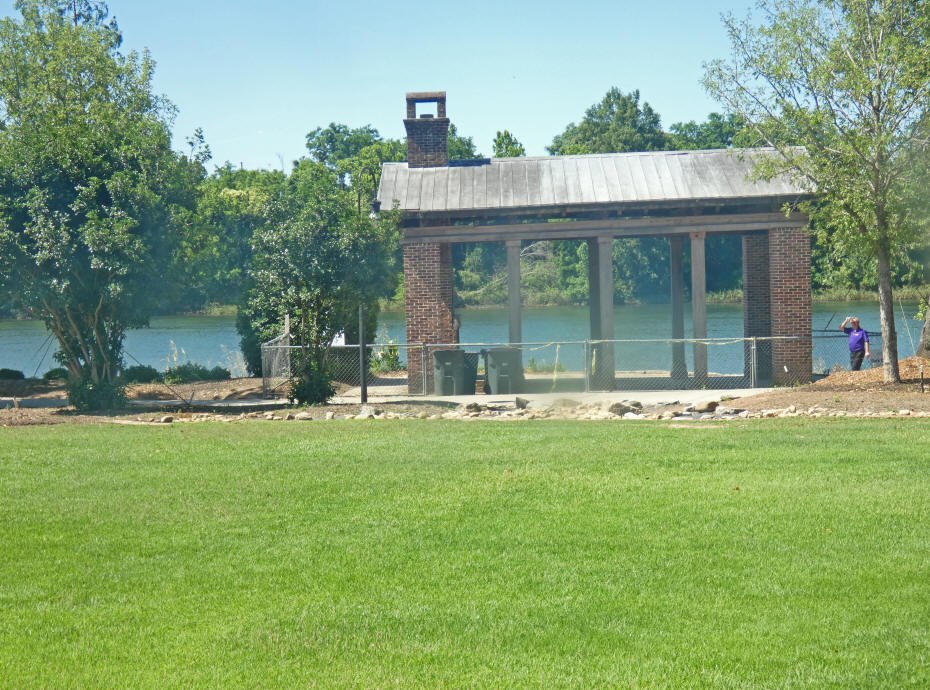
We took a walk along the Savannah
Riverwalk. It's a beautiful and totally different area from
downtown. I'm not big on sports, but I must admit, the
amphitheater is fantastic. I'd love to hear a concert there.
Conclusion
I know this is a long post, but there is a
lot to see and do in Thoroughbred Country and I wanted to give
you a taste of it all.
Public
Disclosure Please Read FTC has a law
requiring web sites to let their readers know if any of the
stories are 'sponsored' or compensated. We also are to
let readers know if any of our links are ads. Most are not.
They are just a way to direct you to more information
about the article where the link is placed. We have several ads
on our pages. They are clearly marked as ads. I think
readers are smart enough to know an ad when they see one but to
obey the letter of the law, I am putting this statement here to
make sure everyone understands. American Roads and Global
Highways may contain affiliate links or ads. Further, as their
bios show, most of the feature writers are professional travel
writers. As such we are frequently invited on press trips, also
called fam trips. On these trips most of our lodging, dining,
admissions fees and often plane fare are covered by the city or
firm hosting the trip. It is an opportunity to visit places we
might not otherwise be able to visit. However, no one tells us
what to write about those places. All opinions are 100% those
of the author of that feature column.
| 
